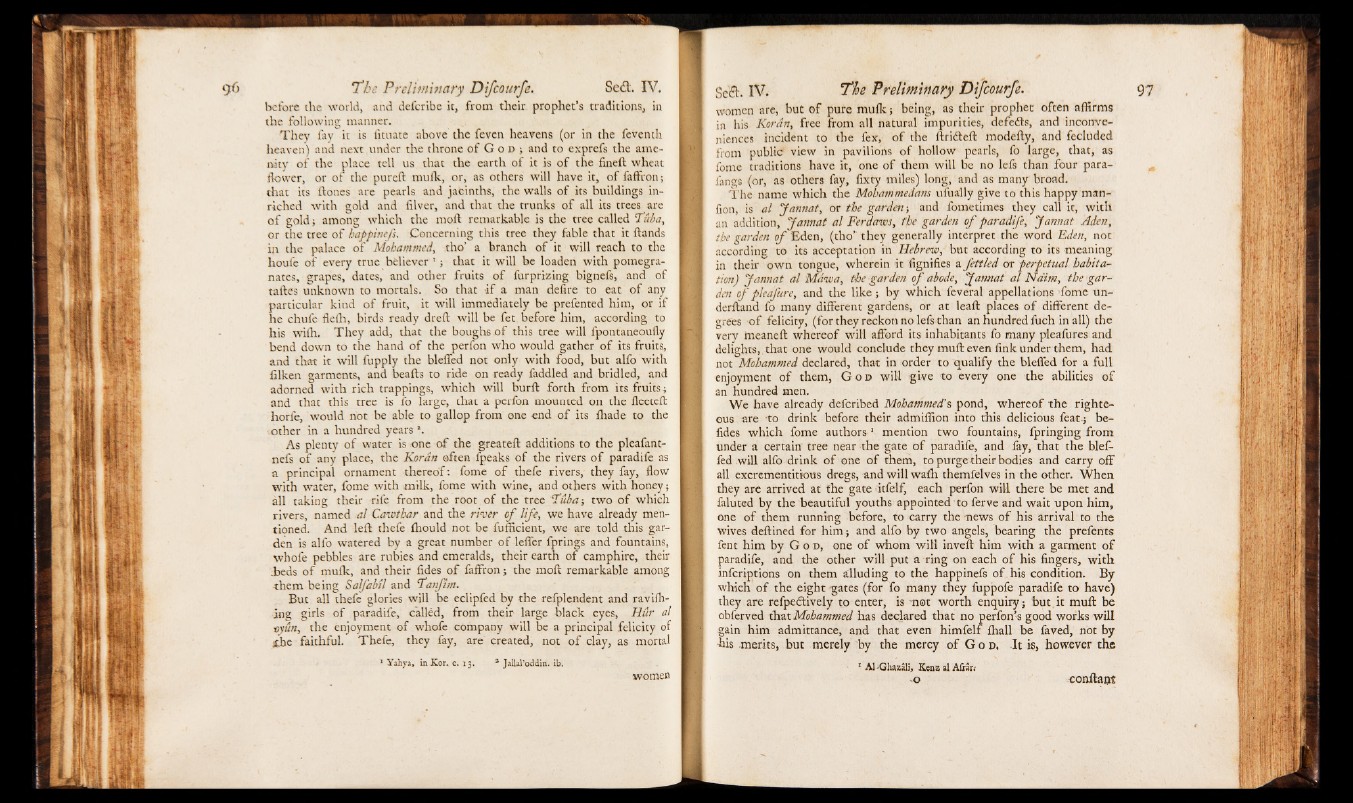
before the world, and delcribe it, from their prophet’s traditions, in
the following manner.
They fay it is fituate above the feven heavens (or in the feventh
heaven) and next under the throne o f G o d ; and to exprefs the amenity
of the place tell us that the earth of it is o f the fineft wheat
flower, or of the pureft mufk, or, as others will have it, of faffron;
that its ftones are pearls and jacinths, the walls of its buildings in-
riched with gold and filver, and that the trunks of all its trees are
o f gold; among which the moft remarkable is the tree called ’Tuba,
or the tree of happinefs. Concerning this tree they fable that it Hands
in the palace of Mohammed, tho’ a branch of it will reach to the
houl'e of every true believer 1 ; that it will be loaden with pomegranates,
grapes, dates, and other fruits of furprizing bignefs, and of
taftes unknown to mortals. So that i f a man defire to eat of any
particular kind of fruit, it will immediately be prefented him, or if
lie chufe flefh, birds ready dreft will be fet before him, according to
his wifh. They add, that the boughs of this tree will fpontaneoufly
bend down to the hand of the perfon who would gather of its fruits,
and that it will fupply the bleffed not only with food, but alfo with
filken garments, and beafts to ride on ready faddled and bridled, and
adorned with rich trappings, which will burft forth from its fruits;
and that this tree is fo large, that a perfon mounted on the fleeteft
horfe, would not be able to gallop from one end of its fliade to the
-Other in a hundred years \
As plenty of water is one of the greateft additions to the pleafant-
nefs of any place, the Koran often fpeaks of the rivers of paradife as
a principal ornament thereof: fome of thefe rivers, they fay, flow
with water, fome with milk, fome with wine, and others with honey;
all taking their rife from the root of the tree Tuba; two of which
rivers, named al Cawthar and the river o f life, we have already mentioned.
And left thefe fliould not be fufficient, we are told this garden
is alfo watered by a great number of leflfer fprings and fountains,
whofe pebbles are rubies and emeralds, their earth of camphire, their
.beds of mufk, and their fides of faffron; the moft remarkable among
-them being Salfabtl and TanJirn.
But all thefe glories will be eclipfed by the refplendent and ravifh-
ing girls of paradife, called, from their large black eyes, Hur al
■ oyun, the enjoyment of whole company will be a principal felicity of
die faithful. Thefe, they fay, are created, not of clay, as mortal
women
women are, but o f pure mufk; being, as their prophet often affirms
in his Koran, free from all natural impurities, defeats, and inconveniences
incident to the fex, of the ftridteft modefty, and fecluded
from public view in paviliohs of hollow pearls, fo large, that, as
fome traditions have it, one of them will be no lefs than four para-
fangs (or, as others fay, fixty miles) long, and as many broad.
The name which the Mohammedans ufua'lly give to this happy man-
fion, is al Jannat, or the garden-, and fometimes they call it, with
an addition, Jannat al Ferdaws, fhe garden o f paradife, Jannat Aden,
the garden o f Eden, (tho’ they generally interpret the word Eden, not
according to its acceptation in Hebrew, but according to its meaning
in their own tongue, wherein it fignifies a fettled or perpetual habita-
tion) Jannat al Mdwa, the garden of abode, Jannat al Naim, the garden
o f pleasure, and the like; by which feveral appellations fome un-
derftand fo many different gardens, or at leaft places of different degrees
of felicity, (for they reckon no lefs than an hundred fuch in all) the
very tneaneft whereof will afford its inhabitants fo many pleafures and
delights, , that one would conclude they muft even fink under them, had
not Mohammed declared, that in order to qualify the bleffed for a full
enjoyment of them, G o d will give to every one the abilities of
an hundred men.
We have already deferibed Mohammed’s pond, whereof the righteous
are ’to drink before their admiffion into this delicious feat-; be-
fides which fome authors1 mention two fountains, fpringing from
under a certain tree near the gate of paradife, and fay, that the bleffed
will alfo drink of one of them, to purgetheir bodies and carry off
all excrementitkras dregs, and will wafh themfelves in the other. When
they are arrived at the gate itfelf, each perfon will there be met and
faluted by the beautiful youths appointed to ferve and wait upon him,
one of them running before, to carry the news of his arrival to the
wives deftined for him; and alfo by two angels, bearing the prefents
fent him by G od, one of whom will inveft him with a garment o f
paradife, and the other will put a ring on each of his fingers, with
inferiptions on them alluding to the happinefs of his condition. By
which o f the eight ■ gates (for fo many they fuppofe paradife to have)
they are refpedtively to enter, is -not worth enquiry; but.it muft be
obferved that Mohammed has declared that no perfon’s good works will
gain him admittance, and that even himfelf fhall be faved, not by
■ his merits, but merely by the mercy of G od. It is> however the
1 Al -Ghazali, Kenz al Afrar.-
-o conftaijt